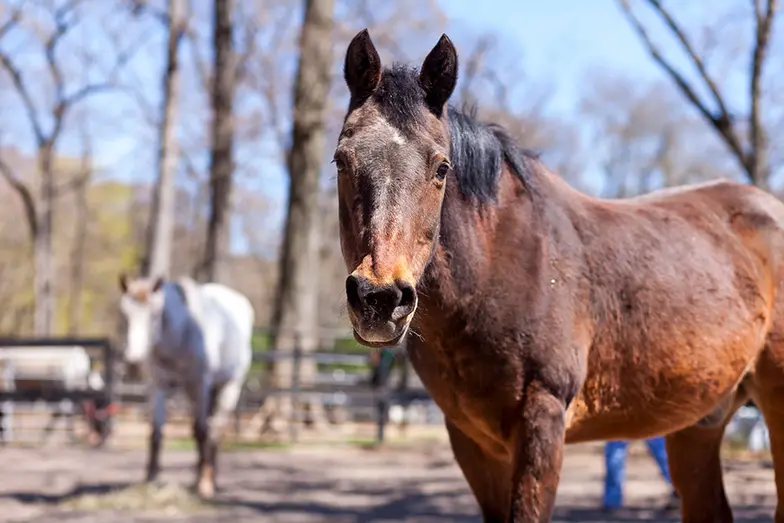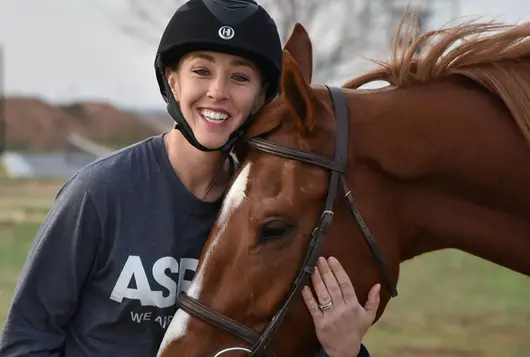Strategies for Placing Special Needs Horses

Finding homes for special needs horses requires out-of-the-stall thinking. If you're feeling stumped, check out these winning suggestions and strategies used by This Old Horse in Hastings, MN, and RVR Horse Rescue in Riverview, FL.
Be mindful of how you're presenting your horses to the public. Nancy Turner, president and founder of This Old Horse, says she prefers to “show our horses as powerful, not pitiful.” Although an appeal to an adopter’s sympathy might work for some, Turner’s group believes positive messaging creates more opportunities for the horses.
This Old Horse created a grant-winning adoption video where they showcased Kit, a blind senior horse. Instead of calling out Kit’s physical limitations, they highlighted what she likes to do—hang out and listen to her sponsor sing!
Kelly Ford, executive board secretary and spokesperson for RVR Horse Rescue, agrees and says it’s better to highlight a horse’s progress than the bad situation from which they came. “We highlight the personalities and abilities,” says Ford, “focusing on what a horse can do rather than what they can’t.”
Both organizations use clever partnerships and promotions to capture the attention of potential adopters. Here are some ideas:
- Lesson Barns. Ford recommends partnering with lesson barns and private boarding facilities that may be interested in adopting a senior horse for teaching basic horse care (grooming, hoof care, tacking up). This is a win-win because the facility gets experienced and safe horses for novice customers and the horses get doted upon by many people. She also suggests trying to secure a discounted boarding rate for people who adopt special needs and senior horses.
- Seniors for Seniors. In 2017, RVR began a “Save Our Seniors” promotion, encouraging seniors—including many people as young as their mid-50s—to adopt older horses. This marketing tactic is working well for the group, which has so far adopted out 14 senior horses.
- Horse Shows. Turner suggests partnering with local horse shows on special awards for senior and special needs horses to bring them more attention. Several local horse shows got on board and now give out a “See What This Old Horse Can Do” award.
- Horses as Matchmakers. Ford encourages groups to let horses make their own connections with visitors. She says horses often sell themselves and that by “gently exposing adopters to special needs horses, the horses can work their magic.” Moon was a special needs horse at RVR with a cleft palate who was adopted by a family who was not looking for a special needs horse but fell in love with him when an adoption counselor casually pointed him out.
- Group Adoptions. Allowing multiple people to adopt one horse can embolden on-the-fence-adopters to become horse owners. This is a great option for first-time adopters to share costs and support one another and gives the horses more people to love and support them.
Grow your own adopters. In addition to group adoptions, there are many other tactics to encourage first-time horse owners to adopt. Turner says “growing their own adopters” is a priority of the organization.
They have programs to match inexperienced horse people with horses and mentors—all of which have the goal of cultivating new adopters. One of the programs, Hands on Horses, includes bi-weekly grooming sessions and educational speakers to help develop new horse owners.
Provide ongoing support. Providing support to adopters before, during and after they adopt will help them overcome concerns they may have about taking on a special needs horse. In the case of Moon, the horse with the cleft palate, RVR made sure their vet was available to speak with the adopter’s vet to explain Moon’s special feeding protocol.
Ford says flexibility is key for supporting adopters. One adopter, for example, had recently lost a senior horse and wanted to get a companion for her remaining senior. However, she was in her 70s and worried that if she passed away before her horses, her family would be stuck placing two senior horses.
To address her concern, RVR created an addendum to the adoption contract promising they would come pick up the horse and assume ownership of her if the adopter passed away first.
Turner also recommends providing safety net support to any adopters who may end up in an emergency. “Sometimes if people just get some help to keep the horse they have, the horse doesn’t need placement” she points out.
For more ideas on homing harder-to-place equines, listen to the recorded webinar How to Home Special Needs and Unrideable Horse.
We have lots more on this subject:

